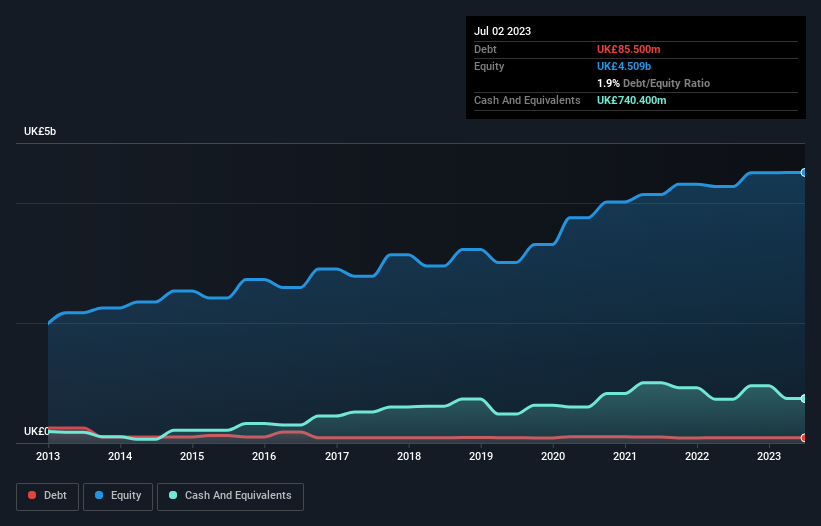- United Kingdom
- /
- Consumer Durables
- /
- LSE:TW.
We Think Taylor Wimpey (LON:TW.) Can Stay On Top Of Its Debt

Howard Marks put it nicely when he said that, rather than worrying about share price volatility, 'The possibility of permanent loss is the risk I worry about... and every practical investor I know worries about.' So it seems the smart money knows that debt - which is usually involved in bankruptcies - is a very important factor, when you assess how risky a company is. We note that Taylor Wimpey plc (LON:TW.) does have debt on its balance sheet. But the real question is whether this debt is making the company risky.
When Is Debt A Problem?
Debt and other liabilities become risky for a business when it cannot easily fulfill those obligations, either with free cash flow or by raising capital at an attractive price. In the worst case scenario, a company can go bankrupt if it cannot pay its creditors. However, a more usual (but still expensive) situation is where a company must dilute shareholders at a cheap share price simply to get debt under control. Of course, plenty of companies use debt to fund growth, without any negative consequences. When we think about a company's use of debt, we first look at cash and debt together.
See our latest analysis for Taylor Wimpey
How Much Debt Does Taylor Wimpey Carry?
As you can see below, Taylor Wimpey had UK£85.5m of debt, at July 2023, which is about the same as the year before. You can click the chart for greater detail. However, its balance sheet shows it holds UK£740.4m in cash, so it actually has UK£654.9m net cash.

How Strong Is Taylor Wimpey's Balance Sheet?
We can see from the most recent balance sheet that Taylor Wimpey had liabilities of UK£1.23b falling due within a year, and liabilities of UK£620.6m due beyond that. On the other hand, it had cash of UK£740.4m and UK£164.4m worth of receivables due within a year. So its liabilities total UK£944.0m more than the combination of its cash and short-term receivables.
Given Taylor Wimpey has a market capitalization of UK£5.19b, it's hard to believe these liabilities pose much threat. However, we do think it is worth keeping an eye on its balance sheet strength, as it may change over time. While it does have liabilities worth noting, Taylor Wimpey also has more cash than debt, so we're pretty confident it can manage its debt safely.
On the other hand, Taylor Wimpey saw its EBIT drop by 9.6% in the last twelve months. If earnings continue to decline at that rate the company may have increasing difficulty managing its debt load. The balance sheet is clearly the area to focus on when you are analysing debt. But ultimately the future profitability of the business will decide if Taylor Wimpey can strengthen its balance sheet over time. So if you want to see what the professionals think, you might find this free report on analyst profit forecasts to be interesting.
Finally, a company can only pay off debt with cold hard cash, not accounting profits. Taylor Wimpey may have net cash on the balance sheet, but it is still interesting to look at how well the business converts its earnings before interest and tax (EBIT) to free cash flow, because that will influence both its need for, and its capacity to manage debt. In the last three years, Taylor Wimpey's free cash flow amounted to 46% of its EBIT, less than we'd expect. That weak cash conversion makes it more difficult to handle indebtedness.
Summing Up
Although Taylor Wimpey's balance sheet isn't particularly strong, due to the total liabilities, it is clearly positive to see that it has net cash of UK£654.9m. So we don't have any problem with Taylor Wimpey's use of debt. There's no doubt that we learn most about debt from the balance sheet. But ultimately, every company can contain risks that exist outside of the balance sheet. We've identified 2 warning signs with Taylor Wimpey (at least 1 which doesn't sit too well with us) , and understanding them should be part of your investment process.
If you're interested in investing in businesses that can grow profits without the burden of debt, then check out this free list of growing businesses that have net cash on the balance sheet.
Valuation is complex, but we're here to simplify it.
Discover if Taylor Wimpey might be undervalued or overvalued with our detailed analysis, featuring fair value estimates, potential risks, dividends, insider trades, and its financial condition.
Access Free AnalysisHave feedback on this article? Concerned about the content? Get in touch with us directly. Alternatively, email editorial-team (at) simplywallst.com.
This article by Simply Wall St is general in nature. We provide commentary based on historical data and analyst forecasts only using an unbiased methodology and our articles are not intended to be financial advice. It does not constitute a recommendation to buy or sell any stock, and does not take account of your objectives, or your financial situation. We aim to bring you long-term focused analysis driven by fundamental data. Note that our analysis may not factor in the latest price-sensitive company announcements or qualitative material. Simply Wall St has no position in any stocks mentioned.
About LSE:TW.
Flawless balance sheet and undervalued.


